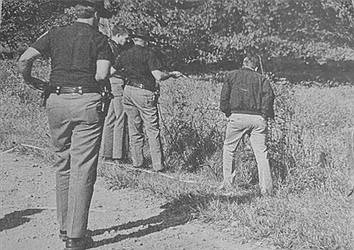Hostile work environment investigation results discussed at BTC meeting
July 21, 2023 at 9:56 a.m.
In May of this year, Chuck Campbell and Curtis Ward alleged Brookville Town Council President Bridget Hayes was creating a hostile work environment. In light of Ward and Campbell’s statements, the town council voted to approve an investigation into the complaints of Hayes creating a hostile work environment for town employees. Hayes was fully on board with the investigation and expressed how important she felt it was to follow up on legal claims of this nature to avoid future problems and lawsuits for Brookville. The Bose McKinney Law Firm was hired to complete the investigation. The investigation results were received from Bose Mckinney and discussed in a BTC Executive Session, then they were further provided to Brookville residents at the regular BTC meeting on Monday, July 17.
Subjecting employees to a hostile work environment, as legally defined, is a violation of civil rights laws for which an employer can be held liable if violations exist. The adverse treatment must be based on legally protected characteristics, such as race, age, sex or other protected category.
On June 13, attorney Mark Wilford interviewed Ward and Campbell. Wolford then worked with the town clerk-treasurer, Gina Gillman, to schedule interviews of town employees identified by Ward and or Campbell as having made a complaint about Hayes, and on June 16, Wolford traveled to Brookville to conduct the employee interviews. He concluded by interviewing Hayes. At the suggestion of Hayes, Wolford contacted an additional town employee and conducted a phone interview on June 26.
Concurrent with Wolford’s investigation interviews, the town council also voted to send anonymous surveys to town department heads with questions directed towards Hayes’s management style and the working environment in town. Wolford coordinated with board member Earl Moore to receive the sealed surveys and tabulate the finding results. Interviews and survey results presented negative and positive reviews of Hayes as a leader, with a near split of employees critical of Hayes and those expressing no concern or issues with her. However, and importantly for purposes of assessing hostile work environments, the critical claims received regarding Hayes’s style and employee treatment is not dependent on race, age, sex or any other legally protected characteristic of the person with some she is dealing with. Instead, the general consensus was that Hyes works well with some and is critical of others depending on whether they agree with her vision for how the town should operate. Complaints focused on Hayes alleged micro-management and demanding personality.
However, the specific claims made were not supported by evidence. In the statement from the attorney, it said, “Nevertheless, there was no evidence presented, and no articulated concern that protected class for example, the race, age or sex of any employee is a motivating factor in Hayes’s beliefs motivations or actions outside of disputes, for how the town should be run, how the council should operate and personality clashes.”
For reasons mentioned and additional reasoning provided, the allegations and evidence presented in the investigation failed to substantiate a claim that Hayes created a hostile work environment under the law. Now that the town has gone through this process and the investigation has concluded, the town council believes it is important to remind everyone of the town’s anti-harassment policy that sets forth a procedure for making a complaint and the specific protections and rights afforded to employees, including a now retaliation provision for making a complaint or participating in an investigation into harassment claims.
Ultimately the investigation proved that there is no basis for violating the hostile work environment claim.
Latest News
E-Editions
Events
In May of this year, Chuck Campbell and Curtis Ward alleged Brookville Town Council President Bridget Hayes was creating a hostile work environment. In light of Ward and Campbell’s statements, the town council voted to approve an investigation into the complaints of Hayes creating a hostile work environment for town employees. Hayes was fully on board with the investigation and expressed how important she felt it was to follow up on legal claims of this nature to avoid future problems and lawsuits for Brookville. The Bose McKinney Law Firm was hired to complete the investigation. The investigation results were received from Bose Mckinney and discussed in a BTC Executive Session, then they were further provided to Brookville residents at the regular BTC meeting on Monday, July 17.
Subjecting employees to a hostile work environment, as legally defined, is a violation of civil rights laws for which an employer can be held liable if violations exist. The adverse treatment must be based on legally protected characteristics, such as race, age, sex or other protected category.
On June 13, attorney Mark Wilford interviewed Ward and Campbell. Wolford then worked with the town clerk-treasurer, Gina Gillman, to schedule interviews of town employees identified by Ward and or Campbell as having made a complaint about Hayes, and on June 16, Wolford traveled to Brookville to conduct the employee interviews. He concluded by interviewing Hayes. At the suggestion of Hayes, Wolford contacted an additional town employee and conducted a phone interview on June 26.
Concurrent with Wolford’s investigation interviews, the town council also voted to send anonymous surveys to town department heads with questions directed towards Hayes’s management style and the working environment in town. Wolford coordinated with board member Earl Moore to receive the sealed surveys and tabulate the finding results. Interviews and survey results presented negative and positive reviews of Hayes as a leader, with a near split of employees critical of Hayes and those expressing no concern or issues with her. However, and importantly for purposes of assessing hostile work environments, the critical claims received regarding Hayes’s style and employee treatment is not dependent on race, age, sex or any other legally protected characteristic of the person with some she is dealing with. Instead, the general consensus was that Hyes works well with some and is critical of others depending on whether they agree with her vision for how the town should operate. Complaints focused on Hayes alleged micro-management and demanding personality.
However, the specific claims made were not supported by evidence. In the statement from the attorney, it said, “Nevertheless, there was no evidence presented, and no articulated concern that protected class for example, the race, age or sex of any employee is a motivating factor in Hayes’s beliefs motivations or actions outside of disputes, for how the town should be run, how the council should operate and personality clashes.”
For reasons mentioned and additional reasoning provided, the allegations and evidence presented in the investigation failed to substantiate a claim that Hayes created a hostile work environment under the law. Now that the town has gone through this process and the investigation has concluded, the town council believes it is important to remind everyone of the town’s anti-harassment policy that sets forth a procedure for making a complaint and the specific protections and rights afforded to employees, including a now retaliation provision for making a complaint or participating in an investigation into harassment claims.
Ultimately the investigation proved that there is no basis for violating the hostile work environment claim.





